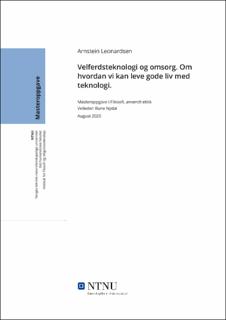| dc.description.abstract | Abstract
A central question in the ethics of technology, is how we can live good lives with all the technology that in different ways condition our lives. This has become an important question, because to live good lives more than ever is conditioned by living well with technology that we can´t opt out. A central part of the challenge according to such philosophers in technology as Paul-Peter Verbeek and Shannon Vallor, is that we are stuck in the thinking of modernity. This makes us have an instrumental relation to technology, where technology appears as a tool to reach our goals, and morality as a purely human affair. This which I name the traditional perspective of technology, put limits to our understanding of how technology affects our moral action and decisions.
We need another perspective and language. The aim of this thesis is to show that this perspective and language exists, and to discuss how it can help to understand how technology influences both our moral actions and decisions. Peter-Paul Verbeek and Shannon Vallor both represent a way of understanding technology that give us such a perspective and language.
I argue that their technological perspective offers the best way of understanding how technology affect us and our moral actions and decisions. Both have a relational view on technology. A central idea in Verbeeks work is about the connection between humans and technology and that moral agency is et hybrid affair.
Vallor discusses how we can live well with technology. This is a matter of formation of moral character, she argues that we need to cultivate in ourselves, collectively, a special kind of moral character that expresses what she calls the technomoral virtues.
I have placed the discussion in professional care and use of welfare technology, because care is a moral concept and because professional care represents a “place” where the traditional perspective on technology is prevailing. Through the discussion of two different cases which are about use of welfare technology, I aim to demonstrate that the alternative understanding of technology is the one most suited to explain how technology influences our moral actions and decisions. | |
